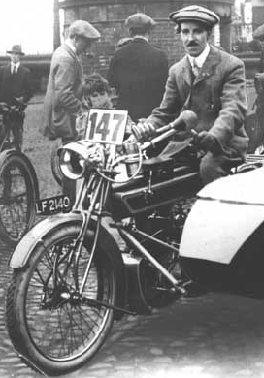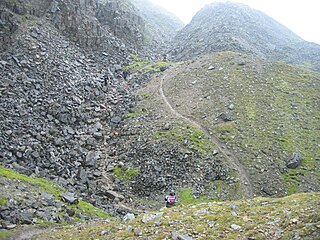Related Research Articles
Motorcycle sport is a broad field that encompasses all sporting aspects of motorcycling. The disciplines are not all races or timed-speed events, as several disciplines test a competitor's various riding skills.

The Isle of Man TT or Tourist Trophy races are an annual motorcycle racing event run on the Isle of Man in May/June of most years since its inaugural race in 1907. The event is often called one of the most dangerous racing events in the world as many competitors have died.

Motocross is a form of off-road motorcycle racing held on enclosed off-road circuits. The sport evolved from motorcycle trials competitions held in the United Kingdom.

Cycle speedway is a form of bicycle racing on short oval dirt tracks, usually outdoors, occasionally indoors, typically 70–90 metres long. Like motorcycle speedway, riders use machines without brakes or multiple gears but, unlike motor speedway, the object is not to slide bikes round the turns.

Enduro is a form of motorcycle sport run on extended cross-country, off-road courses. Enduro consists of many different obstacles and challenges. The main type of enduro event, and the format to which the World Enduro Championship is run, is a time-card enduro, whereby a number of stages are raced in a time trial against the clock.

Motorcycle trials, also known as observed trials, often called simply trial/s, is a non-speed event on specialized motorcycles. The sport is most popular in the United Kingdom and Spain, though there are participants around the globe.

Motorcycle racing is the motorcycle sport of racing motorcycles. Major varieties include motorcycle road racing and off-road racing, both either on circuits or open courses, and track racing. Other categories include hill climbs, drag racing and land speed record trials.
James Guthrie was a Scottish motorcycle racer.

An enduro motorcycle is an off-road racing motorcycle used in enduros, which are long-distance cross-country, Trails, time trial competitions.
Edward Frend, born in South London, was a British motorcycle sports competitor from the late 1930s to the early 1950s, road racing with the AJS works team from 1948 to 1954.
Howard R. Davies, was an English motorcycle racing champion, motorcycle designer and originator of the 'HRD' marque which later became Vincent-HRD motorcycles. He died in January 1973.

The 1954 Isle of Man Tourist Trophy was the second race in the 1954 Grand Prix motorcycle racing season and proved highly controversial for TT Course and race changes. The 1954 Junior TT was the first race where the official race distance was reduced from 7 laps to 5 laps. The 1954 Senior TT Race was stopped at half distance due to the weather conditions on the Mountain Section of the course.

Charles Richard Collier (1885–1954) of Plumstead, London, was a British motorcycle racer famous for winning Isle of Man TT races twice in his career. After competing in the 1906 International Cup Races on the European continent, Charlie Collier became the first Isle of Man TT race winner in 1907.
Georg "Schorsch" Meier was a German motorcycle racer famous for being the first foreign winner of the prestigious Senior TT, the Blue Riband race of the Isle of Man TT Races, in 1939 riding for the factory BMW team and the first motorcycle racer to lap a Grand Prix course at over 100 mph.
Tommy Robb is a former Grand Prix motorcycle road racer from Northern Ireland.

The Scott Trial is a British motorcycle trials competition dating from 1914 run over an off-road course of approximately 70 miles. One of the most challenging trials events in the UK, its appeal is to clubman riders as well as international professional riders. The Scott raises money for the "Scott charities", a range of local non-profit making organisations.
Marjorie Cottle was an English works supported motorcycle trials rider. She was one of Britain's best-known motorcyclists in the 1920s and 1930s. She competed regularly in reliability trials and was considered to be one of the best riders in the country – male or female. Her greatest success was the International Six Days Trial of 1927, in which the British Ladies' Team won the International Silver Vase. That year the trial was held in the Lake District, and attracted a large number of competitors. She was described as the "most famous girl rider in the world".

Mick Andrews, is an English former international motorcycle trials rider. He was FIM European Trials Champion in 1971 and 1972 and is a five times winner of the Scottish Six Days Trial, taking the laurels in 1970, 1971, 1972, 1974 and 1975, equalling the record set by Sammy Miller. In 2015, Andrews was named an FIM Legend for his motorcycling achievements.
Eric Williams DCM FIMI (1893-1963) was a British pioneer of motor cycle racing, motor vehicles and automated agricultural harvesting equipment. He was a two-time winner of the Isle of Man Junior TT race in 1914 and 1921 and also gave distinguished military service in First World War as a despatch rider, receiving the Distinguished Conduct Medal (DCM) for bravery. In the Second World War he served as an advisor in Ministry of Agriculture working on mechanical production in Worcestershire. He raced professionally for AJS, NUT and Sunbeam. After his racing career he established a motor trade business, Eric Williams Ltd, in Worcester which operated between 1920-1960. He had a lifelong passion for racing activities, which he passed to his younger son, Henry ‘Don’ Williams, who also raced cars and motorcycles competitively.
Eva Askquith (1905–1985), at times misspelt as Ashquith or Asquith, was a pioneering British female speedway motorcycle racer in the three seasons from 1928 and 1930 when female riders were allowed race speedway in Britain. She was one of only four British female speedway riders at this time and also raced internationally.
References
- ↑ Baumann, James (13 May 2005). "The road not taken". The Press-Enterprise.
- 1 2 3 4 5 6 7 "Scottish Six Days Trial". ssdt.org. Retrieved 16 December 2015.
- ↑ The Classic Motor Cycle July 1996, p.43 75 Years Ago Accessed and added 27 June 2014
- ↑ Currie, Bob (1993). Classic British Motorcycles. Chancellor Press. ISBN 1-85152-250-6.